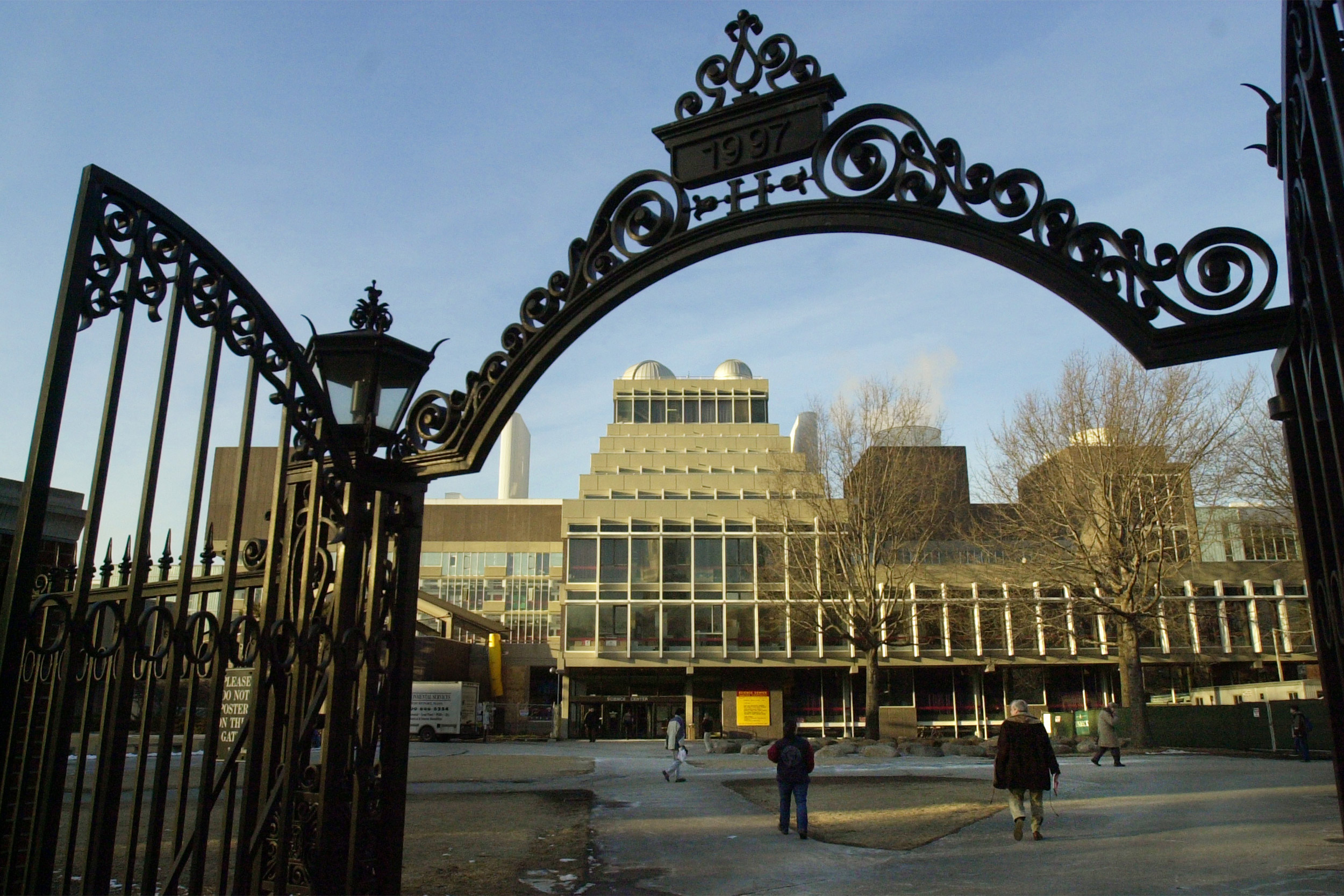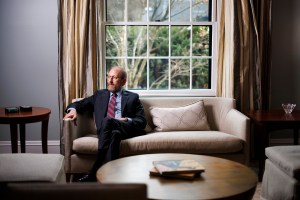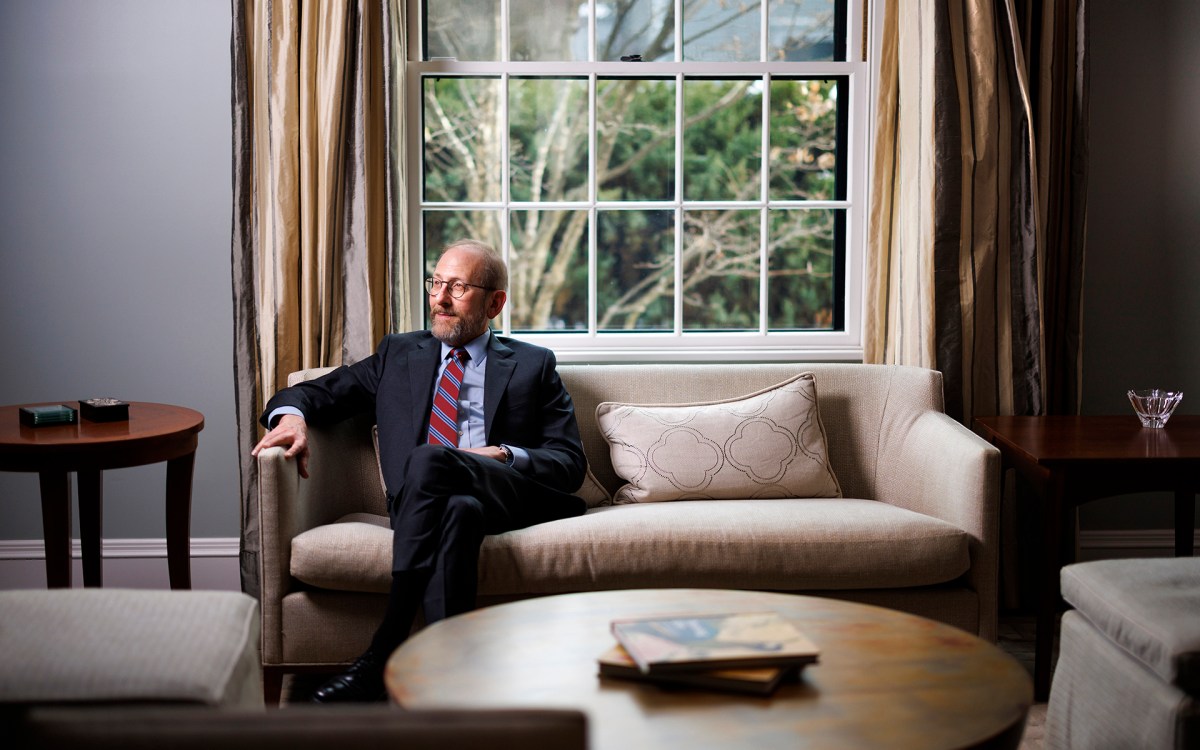
The Science Center on Harvard’s campus.
Kris Snibbe/Harvard file photo
The changing ecosystem of philanthropy
Alan Garber and Brian Lee, VP of Alumni Affairs and Development, discuss the critical role of philanthropic support at Harvard
Provost Alan Garber and Brian Lee, vice president of Alumni Affairs and Development, discuss the critical role of philanthropic support at Harvard and the principles behind Harvard’s gift policy.
Q&A
Alan Garber and Brian Lee
GAZETTE: Harvard has traditionally enjoyed a great deal of engagement and financial support from alumni and donors. Can you tell us why Harvard needs gifts? What role does philanthropy play in the University’s teaching and research mission?
GARBER: At its core, Harvard is a research university. People don’t always realize that research universities are built upon the conviction that the combination of cutting-edge research and student education leads to better research and better education. Because conducting an inquiry at such an advanced level is a complicated and inherently expensive enterprise, philanthropy is absolutely essential.
Our current work on coronavirus is a great example. When the pandemic began, many members of our life sciences community knew they had something to contribute. They began to design and conduct laboratory experiments, epidemiological and clinical studies, and policy analyses. They sought both to contain the pandemic and to build the sets of tools that would enable us to deal with the fallout from this new virus. The range of research was vast. Some investigators sought to understand the reaction of the immune system to the virus. Others studied which drugs could stop viral growth in laboratory conditions. Some developed tests for the virus; others developed tests for the antibodies formed in reaction to it. Many devised protocols to interrupt the spread of infection.
We have a stunning array of talent in our community, but they could not have done the work without the funding to support it. Our scientists, clinicians, and other researchers can’t rely entirely on grants from, say, federal agencies. Those grants are essential to their scientific endeavors, but they are designated for very specific purposes and can’t be applied to other areas of research, even when the need and the promise are great. Philanthropy gives us the ability and the flexibility to innovate and contribute to the best of our ability in circumstances like those we face now.
LEE: Over generations and over centuries this tradition of philanthropy has empowered and enabled Harvard to do extraordinary things. Current-use giving allows us to have immediate impact, while endowed gifts ensure Harvard can pursue excellence in the long term. In addition to what Alan just described, those endowments fund the scholarship of our outstanding faculty members, and they empower us to assemble the most talented students across all of our Schools. None of these things would be imaginable absent the support of alumni and the people who believe in the work that Harvard does. This has never been clearer, especially as the fiscal calendar comes to a close and we are reminded of the support Harvard received this year, even amid unprecedented challenges. And, as Alan mentioned, this support will be more important than ever as we think about the kind of challenges that Harvard will be positioned to help solve moving forward.
GAZETTE: Can you say a bit more about the process of how Harvard identifies priorities and finds donors to support those priorities?
LEE: Harvard’s academic leaders are responsible for identifying institutional needs and establishing fundraising priorities. Donors and fundraisers work together to find a match — and to consider gifts that will have a positive impact on an area of interest, for example, supporting learning, scholarship, research, teaching, or the student experience at Harvard. These gifts enable Harvard to continue to make discoveries and create new knowledge, educate future leaders, contribute to innovation, and pursue positive societal change.
Many of our donors are attracted to Harvard, and they invest in Harvard, because they believe that Harvard will be an effective steward of their philanthropy and that their gift will have impact and will enhance the trajectory of human society in important ways. They see Harvard as a place that is especially well positioned to convene, to create connections, and to pursue excellence through its scholarship, teaching and partnerships.
“From my perspective, an ideal gift is one that satisfies the donor’s goals while meeting the University’s needs and aligning with its goals and values …”
Alan Garber, Provost
GAZETTE: Provost Garber, you serve as chair of Harvard’s gift policy committee, and you’ve shared today a guide that outlines how Harvard approaches philanthropy, including how gifts are considered, accepted, and administered. Can you tell us about the goals and considerations you have in mind as you approach this work?
GARBER: From my perspective, an ideal gift is one that satisfies the donor’s goals while meeting the University’s needs and aligning with its goals and values — enhancing learning, advancing knowledge, deepening understanding, and pursuing truth while upholding academic freedom. The gift policy is intended to make sure that those goals are achieved. What that means in specific terms can vary greatly in a large and diverse university like Harvard. Gifts may enable a wide range of endeavors — from support of scholarship in areas like applied math, music, or South Asian studies, to scientific experimentation, to financial aid for students in any of our Schools, and it can include basic operational support for the University. But what all successful gifts have in common is this: They lead to accomplishments and activities that make the donor proud, and they enable the University to move forward in important dimensions. Our gift policy is intended to provide clarity about how we can create the circumstances to achieve those goals.
LEE: I agree that the best philanthropy is mutually satisfying, and the gift policy committee’s charge and work is to make sure we have the matches we spoke about. The gift policy committee is responsible for helping establish the principles that guide how we consider gifts, and for reviewing unusual or complex issues pertaining to certain gifts. The committee is always thinking about ways to refine our approach. This includes a steadfast commitment to guaranteeing that the funds that we’re receiving are not only put to good use advancing our mission and in alignment with our standards, but are also consistent with terms we agree to with each donor for each gift.
GAZETTE: We’ve talked about the long tradition of philanthropy. What’s different now about how the University considers and handles gifts — and what do you do to make sure policies and practices are current and relevant to today?
GARBER: We are a diverse community with diverse views, and this is a time of social change, with more calls for transparency and explanation in areas that did not come under close scrutiny before. We wanted to share this guide to be accountable for and explicit about the principles that the University draws upon when it considers and accepts gifts.
While the principles behind this have been understood and put into practice by people involved in University fundraising and related activities for a long time, we felt it needed to be codified now, so that the broader community would understand what guides these deliberations. Furthermore, we want to be responsive to concerns that have become more prominent recently. We view policy as something that is grounded in principles and values but whose specific applications and interpretation may vary over time. So the guide is intended to be a living document, subject to discussion and review.
Here, I have to also point out that when it comes to gifts that provoke controversy, each case is different. Any set of written principles needs to be somewhat general, because so much depends on the facts of the particular case in question. That’s why we have the gift policy committee. We have a process, not a set of rules that describe every possible permutation of circumstances. So this gift policy guide that we’ve shared today is intended to be a companion to a process, one that is consultative and always capable of review and improvement.
LEE: The world of philanthropy has changed in important and meaningful ways, and we’ve continuously evolved and adapted along the way. And while we’ve long been following best practices, we felt this was an opportunity to share the principles that guide the philanthropy we will and will not accept. For example, gifts will not be solicited from donors and prospective donors who are known to have a family member applying for admission to Harvard. Similarly, if those same individuals were to offer an unsolicited gift, they would be advised that no gifts to the University should be made at that time.
I should add that serious and significant consultation has been a key element of refining gift policy, especially over this past year. We have held extensive conversations about the issues and challenges we face with academic and administrative leaders across the University, alumni leaders and volunteers, leaders at peer institutions, and colleagues across the University who work closely with our alumni and donor community.
And we’re forging even stronger collaboration and communication. This work is part of our ongoing efforts to grow and adapt, and, importantly, to address President [Larry] Bacow’s call that the gift policy committee consider how the University can expand the universe of gifts that should be evaluated. There are several ways we’re moving forward. We’re in conversations across the Schools about the kinds of training, information, and best practices that should be adapted for all leaders, faculty, and staff involved in fundraising activities. We’re also developing new processes around data governance and will use better technology to enable clear, consistent, and confidential information-sharing, especially with regard to sensitive information.
“These gifts enable Harvard to continue to make discoveries and create new knowledge, educate future leaders, contribute to innovation, and pursue positive societal change.”
Brian Lee, Harvard Alumni Affairs and Development
GAZETTE: Are there key areas of the guide itself that you think are important to highlight?
GARBER: Well, let me just restate the most fundamental premise in all of this: No gift can interfere with academic freedom and academic values. I think that’s crucial, because it goes to the heart of what kind of institution we are. There is no compromise when it comes to academic freedom and academic values. For example, a donor may endow a professorial chair, but he or she does not have a say in who holds it. The same can be said about corporate support for research and similar gifts. It is important to remember that we also have robust conflict-of-interest policies that our faculty must adhere to.
LEE: The guide itself, and the process of reviewing and updating it, gives us an opportunity to clarify, articulate, and share the ways in which our community’s values are fundamental to how gifts are considered, accepted, and put to use at Harvard. In fact, the guide makes clear that we commit ourselves to “respecting the rights, differences, and dignity of individuals; to demonstrating honesty and fair play in all dealings; and to pursuing excellence at all times in all aspects of its work.” These values are at the core of this University and how we do our work as a community — and we know our donors appreciate this, and Harvard’s commitment to these values, just as much.
Interview was lightly edited for clarity and length.




